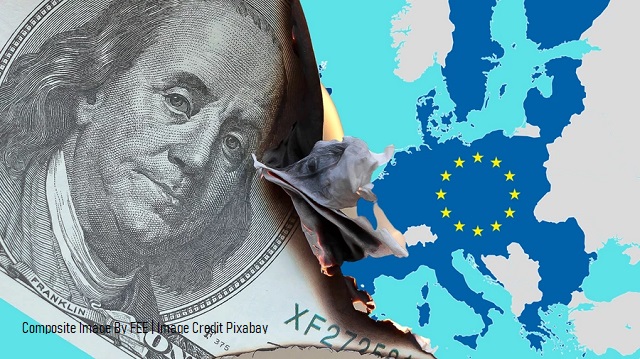IRS Sent $1,200 Stimulus Checks to Random European Citizens, New Reporting Shows

Reckless disregard for efficiency is inherent to all government spending.
Congress is debating another round of COVID-19 stimulus legislation right now. But as the details continue to be hashed out, new evidence keeps mounting that shows just how wasteful and inefficient the first stimulus bill was.
The $2 trillion+ CARES Act, passed in March, sent $1,200 “stimulus” checks to many Americans in hopes of providing relief and stimulating consumer spending. The feds used outdated pre-pandemic tax information to determine eligibility and who to send checks to. This meant that not only were the relief checks not meaningfully targeted to those actually experiencing financial duress amid the COVID-19 lockdowns, but billions in checks were sent to dead people.
Now we’re learning that the Internal Revenue Service also sent checks to an untold number of random European citizens, not Americans, who aren’t even US residents.
“The IRS now acknowledges that its own error caused some citizens of other countries to mistakenly receive $1,200 coronavirus relief payments — and that the mistake is likely to happen again if more stimulus money goes out,” NPR reports.
The IRS now acknowledges its own error caused some citizens of other countries to mistakenly receive $1,200 coronavirus relief payments — and says the error could likely happen again if more stimulus money goes out.https://t.co/jy87nBSQid
— NPR (@NPR) November 30, 2020
For example, Stockholm resident and Swedish citizen Susanne Wigforss received a check from the IRS.
“This is so wrong,” Wigforss told NPR, “because I saw that a number of people were being evicted every month in Chicago, for instance, and I thought one of those families would have needed this stimulus check. Why should a Swedish citizen living abroad receive $1,200?”
“There’s no way I’m going to cash this money — it doesn’t belong to me,” she added. “But how much money is bleeding out from the Treasury Department because of these [misdirected] stimulus checks, I wonder?”
3 months ago, I broke the news that $1200 U.S. stimulus checks were going to foreigners overseas. A lot of liberals didn’t believe our government could be this incompetent and wasteful. Maybe they’ll believe it now that NPR has finally reported on it!https://t.co/ZQ5DxCXpbD https://t.co/8proN2Wu4e
— Thomas Massie (@RepThomasMassie) November 30, 2020
“I didn’t ask for the money. I didn’t expect any money,” Australian citizen Van Shockley said. “But as soon as I got it, I stuck it in the bank. You ain’t getting it back!”
The most maddening part of this whole episode of incompetence is that the IRS has acknowledged this problem yet has not taken any serious steps to correct it retroactively or for future stimulus efforts.
“Since Congress passed its coronavirus relief package in a hurry in March, the US government has put no mechanisms in place to prevent these mistakes from happening again,” NPR reports. “As a result, if a new relief plan with more stimulus payments passes in the final weeks of the Trump administration or during the Biden administration, some of that money is likely to mistakenly end up in mailboxes overseas again.”
The government has no idea how many checks were sent out incorrectly. This is perhaps the most incredible part of the entire stimulus debate.
All of the major programs and initiatives in the CARES Act were consumed by rampant fraud or waste. For example, the stimulus bill’s expansion of unemployment benefits lost $26 billion to fraud—more than the entire unemployment system paid out in 2019. The Paycheck Protection Program was similarly consumed by fraud, and it ended up costing taxpayers a whopping $224,000 per job preserved.
Yet with the debate over a second stimulus bill, lawmakers are pushing to dump more money—the only debate is how much—into the same exact programs without fixing them or addressing the fraud and waste.
Taxpayers are right to find this infuriating. But, unfortunately, they ought not be surprised. Reckless disregard for efficiency and fraud is inherent to government spending, because elected officials are spending other peoples’ money on other people.
“You can spend your own money on yourself,” Nobel laureate economist Milton Friedman explained. “When you do that, why then you really watch out what you’re doing, and you try to get the most for your money.”
“[But] if I spend somebody else’s money on somebody else, I’m not concerned about how much it is, and I’m not concerned about what I get,” Friedman surmised. “And that’s government.”
So, unless something major changes, we should expect serious fraud, dysfunction, and abuse to plague future stimulus bills as well. And yes, that may very well mean more taxpayer dollars ending up in the mailboxes of random European citizens.
COLUMN BY
Brad Polumbo
Brad Polumbo (@Brad_Polumbo) is a libertarian-conservative journalist and Opinion Editor at the Foundation for Economic Education.
EDITORS NOTE: This FEE column is republished with permission. ©All rights reserved.


Someone at the Treasury Department needs to be fired